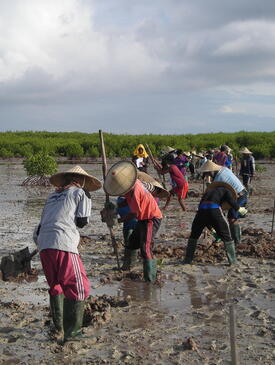Training Series on Ecological Mangrove Rehabilitation
Summary
Indonesia is estimated to have over 3.36 million hectares of mangroves, representing more than 20% of the world’s mangrove area. These mangroves are found across coastal zones in Kalimantan, Sumatra, Sulawesi, Papua, and other islands. These coastal ecosystems play a critical role in protecting shorelines from erosion, serving as nurseries for marine life, sequestering carbon, and supporting the livelihoods of millions of coastal communities. However, over the past decades, mangroves in Indonesia have experienced extensive degradation and conversion, primarily due to aquaculture expansion, coastal development, and unsustainable resource use, such as illegal charcoal production and harvesting for building construction.
In response to these challenges, the Government of Indonesia has set an ambitious target to restore 600,000 hectares of mangroves, supported by various national and international initiatives. Achieving this goal requires well-trained practitioners, policymakers, and community leaders who understand the ecological, social, and technical dimensions of mangrove restoration. However, limited local knowledge and capacity for sustainable mangrove management have often hindered the long-term success of these efforts.
This online training series aims to strengthen the capacity of a wide range of stakeholders—including government agencies, non-governmental organizations (NGOs), practitioners, and community members—who are directly or indirectly involved in mangrove management and restoration. Through expert-led presentations, interactive sessions, and field-based case studies, participants will gain practical knowledge and tools to support inclusive, effective, and ecologically sound mangrove restoration initiatives.
To ensure effective restoration and lasting impact, integrated strategies for mangrove management and monitoring are essential. These strategies should not only support ecological recovery but also enhance the resilience and well-being of coastal communities that depend on mangroves for their livelihoods. Mangrove management involves coordinated actions to conserve, restore, and sustainably utilize mangrove ecosystems while balancing environmental and socio-economic interests. Key components include protection and conservation, sustainable use, and restoration. Meanwhile, regular monitoring is critical for assessing ecosystem health, identifying threats, and evaluating the effectiveness of management interventions.
In support of these goals, Blue Forests – ELTI is launching the second edition of its online training series, focused on strengthening capacity for mangrove ecosystem restoration and management in Indonesia. The delivery language is Indonesian with simultaneous English translation during the sessions.
Content
This training will cover four core topics:
-
Ecological Mangrove Rehabilitation (EMR) on May 27, 2025 - Watch the recording!
- Ben Brown (Charles Darwin University and the co-founder of Blue Forests) showcases lessons learned from EMR-based mangrove rehabilitation efforts in several regions of Indonesia, and Andre Rovai (Senior Scientist at the Smithsonian Environmental Research Center) will present EMR case studies from other regions.
-
Mosaic Mangrove-Aquaculture Management in July 24, 2025 from 1-2:30pm WIB (Jakarta time) - Register here
- Yusran Nurdin (Environmental Technical Advisor, Blue Forests) will present lessons learned from the Mosaic Mangrove-Aquaculture approach implemented by Blue Forests across several regions in Indonesia. A second speaker, Nhung Pham (Ms.), Climate and Energy Practice Lead - WWF-Viet Nam will present a case study on mangrove and aquaculture management in Vietnam.
-
Monitoring Mangrove Ecosystems in August 2025
- Dates, registration, and speaker information coming soon
-
The Role of Mangrove Associations in Supporting Coastal Livelihoods on September 2025
- Dates, registration, and speaker information coming soon


